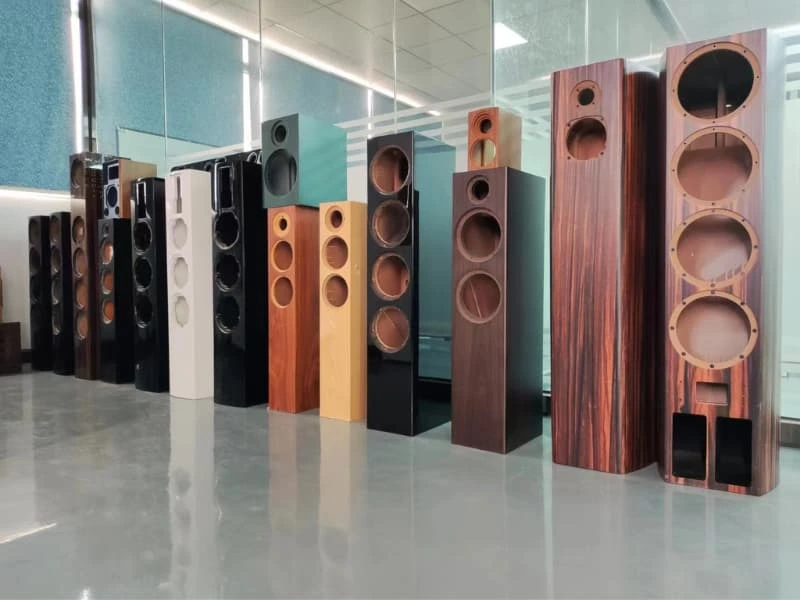Choosing the right hardwood for a speaker cabinet influences sound quality, durability, and aesthetics. Consider options like birch, oak, maple, walnut, and cherry for their unique acoustic properties and visual appeal.
When building a quality speaker cabinet, every detail matters. From the design to the materials used, each component affects the sound quality, durability, and aesthetic appeal. One of the most crucial decisions you’ll make is selecting the right hardwood board. But with so many options available, how do you know which one is the best for your speaker cabinet?
In this comprehensive guide, we’ll explore various types of hardwood, their acoustic properties, and their suitability for speaker cabinets. By the end of this guide, you’ll have a clearer understanding of how to choose the perfect hardwood for your project.
Before we get into the specifics, let’s discuss why hardwood is an important consideration for speaker cabinets.
The choice of material can greatly influence the sound quality of your speakers. Hardwood has natural acoustic properties that can enhance sound resonance. This means that the type of wood you choose can strengthen the sound, reduce unwanted vibrations, and improve the overall listening experience.
Hardwood is known for its strength and durability, meaning your speaker cabinet can withstand wear and tear. Whether you plan to use the cabinet for home audio or professional sound systems, hardwood provides a robust structure that lasts.
Finally, hardwood offers a timeless aesthetic appeal. With its rich textures and colors, it can elevate the look of your speaker cabinet, making it a beautiful addition to any room or stage setup.

Now that you understand the importance of hardwood let’s explore some popular options and their unique characteristics.
Birch is frequently used in speaker cabinets due to its excellent acoustic properties. It offers a bright sound with clear mids and highs, making it ideal for genres requiring detailed sound reproduction. Birch is also lightweight yet strong, which makes it easy to work with.
- Bright sound quality
- Lightweight and strong
- Affordable
- May require additional finishing to enhance appearance
Oak is a popular choice for audiophiles looking for a warm sound. It provides rich bass and smooth mids, making it suitable for various music styles. Oak’s distinct grain patterns add to its visual appeal, giving your speaker cabinet a classic look.
- Warm and rich sound
- Durable and strong
- Attractive grain patterns
- Heavier than birch
Maple is known for its hard and dense structure, translating to a crisp and clear sound. It’s perfect for high-frequency sounds, ensuring that every detail of the music comes through. Maple’s light color and fine grain make it visually appealing as well.
- Crisp and clear sound
- Dense and durable
- Light, attractive appearance
- Can be pricey
Walnut is highly valued for its aesthetic beauty and balanced acoustic properties. It offers a smooth and even sound distribution across all frequencies, providing a rich audio experience. Its deep brown color and unique grain pattern make it a favorite for those seeking beauty and performance.
- Balanced sound profile
- Stunning appearance
- Strong and durable
- Expensive
Cherry wood is another excellent choice, known for its smooth tonal quality and elegant look. It provides a rich and balanced sound, similar to walnut, but with a slightly softer tone. Over time, cherry wood develops a deeper, more luxurious color, adding to its allure.
- Smooth and balanced sound
- Beautiful, evolving color
- Durable
- Prone to scratches
Also Read: Type 2 12Gauge Speaker Wire – Complete Guide!
Selecting the right hardwood goes beyond its acoustic properties. Here are some additional factors to consider:
While some hardwoods like maple and walnut offer superior qualities, they can be expensive. Consider your budget and find a balance between cost and performance.
The weight of the hardwood will impact the portability of the speaker cabinet. If you plan to move the cabinet frequently, opt for lighter woods like birch.
Some hardwoods are easier to work with than others. If you’re building the cabinet yourself, choose a wood that is easy to cut, shape, and finish.
Consider the visual aspect as well. The wood’s natural color and grain pattern should align with your design preferences and complement the environment where the speaker will be used.
Lastly, consider the sustainability of the wood. Look for options that are responsibly sourced, and choose suppliers who prioritize sustainable forestry practices.
Hardwood enhances sound quality, offers durability, and elevates aesthetics. Its natural acoustic properties improve resonance, making it a preferred choice for building speaker cabinets.
Birch provides a bright sound with clear mids and highs. It’s lightweight yet strong, making it ideal for genres requiring detailed sound reproduction without compromising structural integrity.
Oak delivers a warm sound with rich bass and smooth mids. Its distinct grain patterns and strength make it an attractive and durable choice for various music styles.
Yes, maple’s hard and dense structure ensures crisp, clear sound, perfect for high frequencies. Its light color and fine grain also add to its visual appeal.
Walnut offers balanced acoustics with smooth sound distribution. Its stunning appearance and durability make it ideal for those seeking both beauty and performance, despite its higher cost.
When constructing a speaker cabinet, selecting the appropriate hardwood is crucial as it impacts sound quality and longevity. For balanced sound and aesthetics, consider options like birch, oak, maple, walnut, and cherry. Each type offers unique benefits; choose based on your acoustic needs, budget, and design preferences. Enhance your speaker-building project by consulting experts who can provide valuable insights into the best wood choice for your specific requirements.
